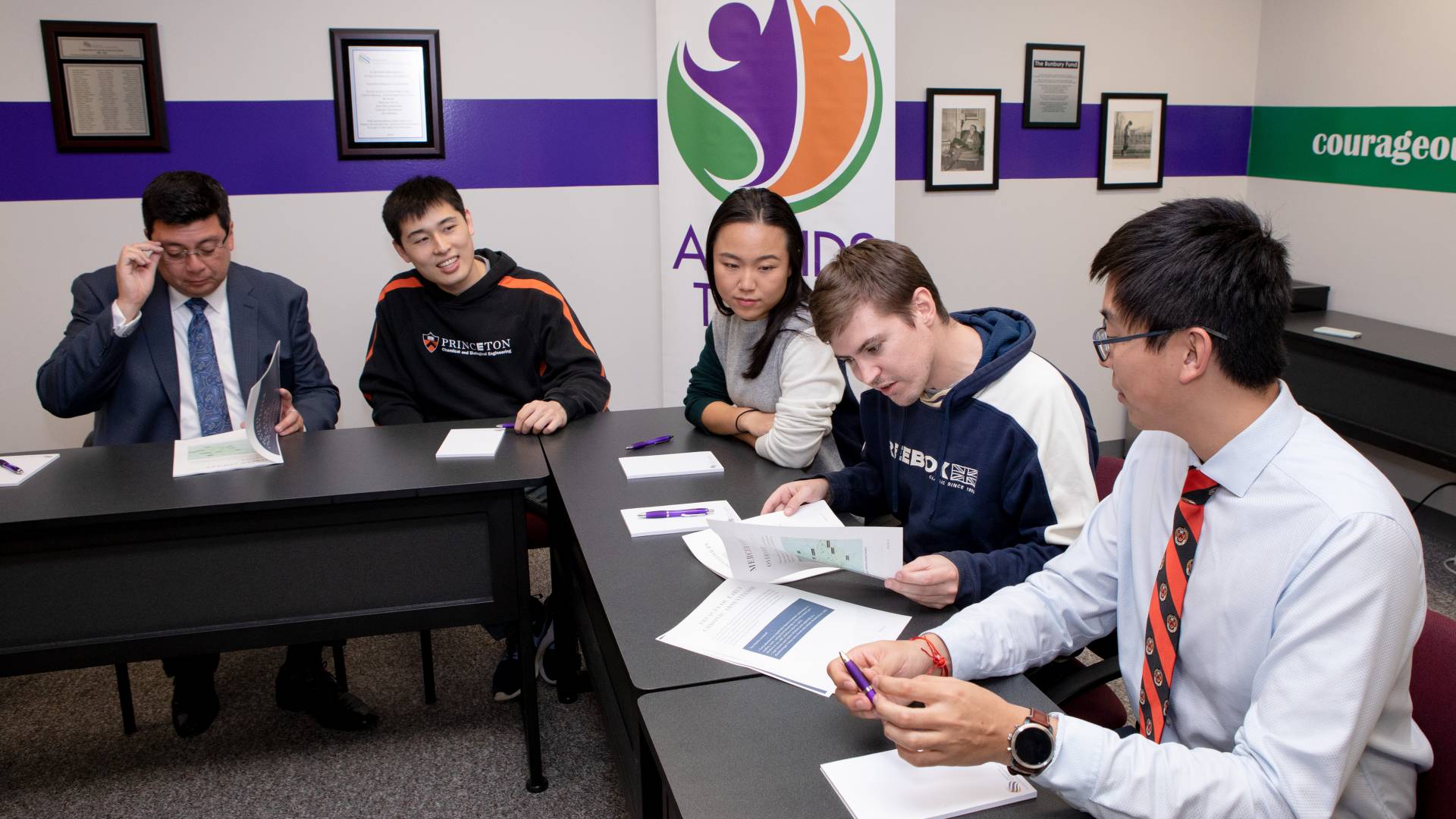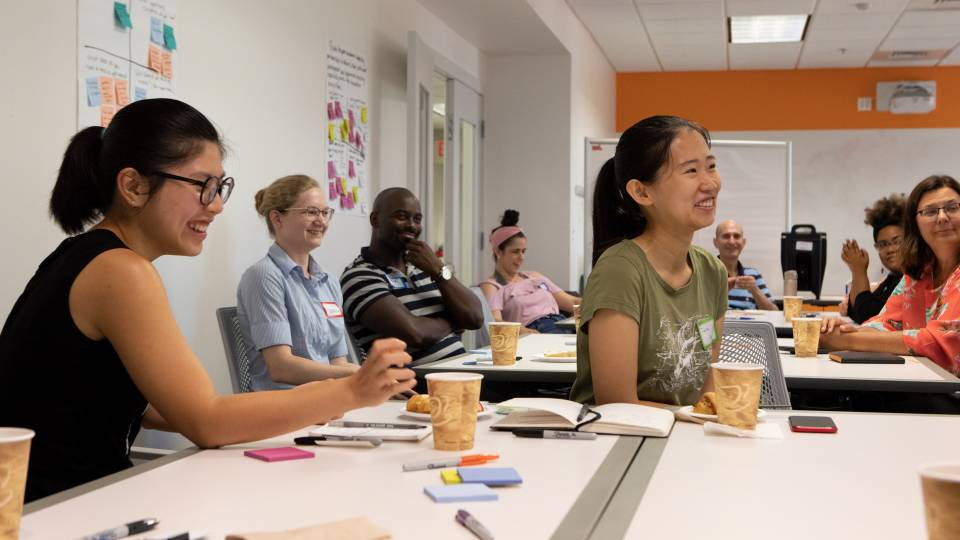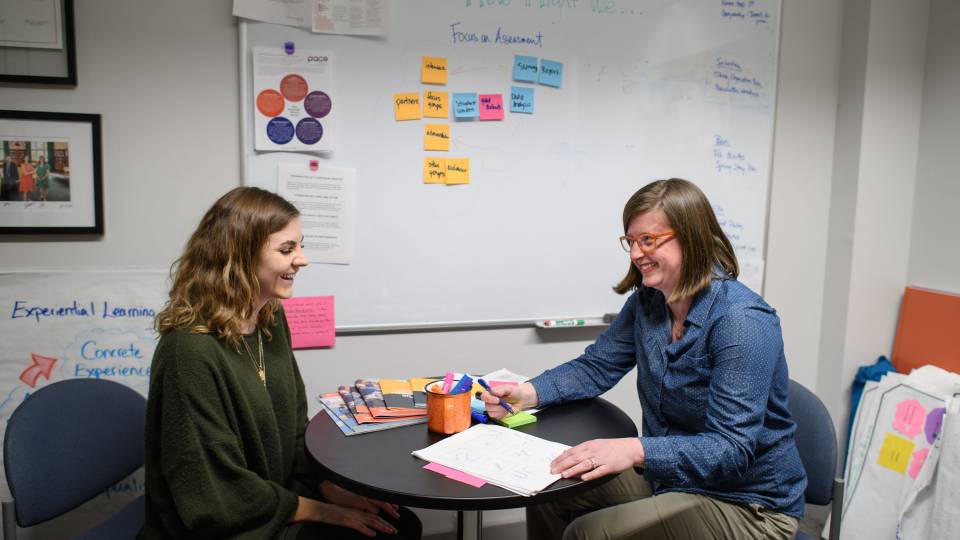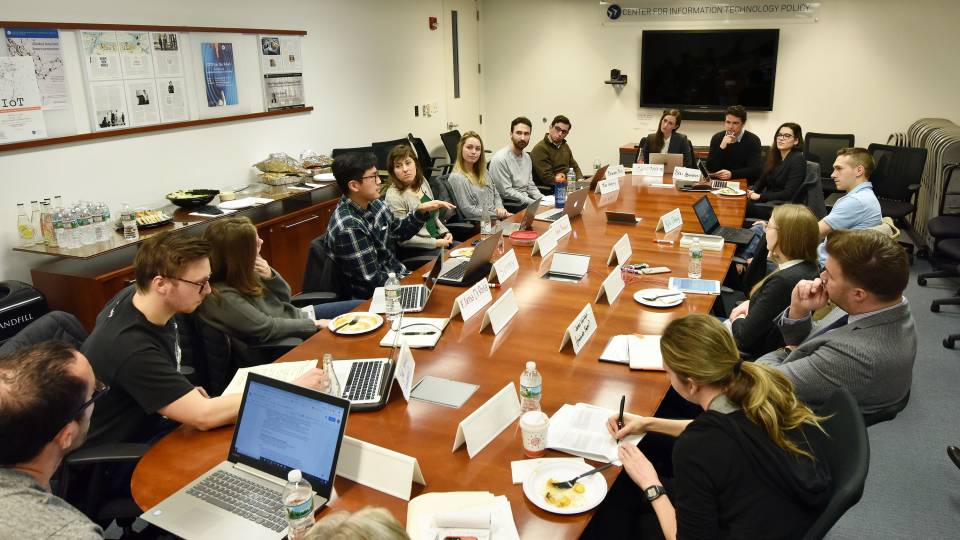Members of Princeton University’s Graduate Consulting Club (PUGCC) meet at the Princeton Area Community Foundation to discuss the findings of their research into chronic absenteeism in Mercer County Schools. The graduate students volunteered their data analysis expertise to the Community Foundation as a way to sharpen their own business skills as they consider opportunities outside academia. From left to right, Jeffrey Vega, president and CEO of the Community Foundation; Wen Kang Chou, vice president of PUGCC’s Volunteer Consulting Initiative; Felicia Zhang, communications chair; Christopher Hale, project leader; and Leon Wang, PUGCC president.
For graduate students pursuing a Ph.D., there are many career opportunities beyond academia.
Felicia Zhang, a fourth-year doctoral student in developmental psychology at Princeton, said she was concerned about the limited number of academic jobs available to her and knew early on that she wanted to explore other career paths. She went on informational interviews with professionals in her field who advised her to get an internship or to work on a project that would demonstrate her abilities apart from her area of research.
Early in 2018, Zhang discovered the Princeton University Graduate Consulting Club (PUGCC). The club was recruiting student consultants to assist the Princeton Area Community Foundation, a local nonprofit. The Community Foundation needed help creating a baseline assessment of chronic absenteeism in Mercer County public schools for a grant program it was developing.
Given Zhang’s research experience in psychology and her interest in education and child development, the project was a perfect way for her to explore a non-academic application of her skills. “It clearly has some kind of relationship to my research and allows me to use my research skills to have some kind of broader impact on the community,” said Zhang, who now serves as PUGCC’s communications chair.
Since 2009, the club has provided Princeton graduate students who are interested in alternate career paths with opportunities to explore consulting and other work options.
“Our motive is to help graduate students who may otherwise not be able to get hands-on experience in these consulting or other industries,” said Leon Wang, PUGCC’s president and a third-year Ph.D. candidate in chemical and biological engineering.
Said Zhang: “Consulting was something I had never thought of as a career before because I didn’t really have any idea what it was. I thought it was something a lot of people in business or finance went into.”

The final report compiled by PUGCC members for the Community Foundation provides a snapshot of absenteeism throughout Mercer County schools. The Community Foundation plans to use the data to administer $3 million in grants to individual schools and districts through its All Kids Thrive initiative.
Through its Volunteer Consulting Initiative, which launched this year, PUGCC pairs students like Zhang with area nonprofits and startup businesses that can benefit from their expertise. This summer, in addition to the Community Foundation, students advised a venture capital firm, a biotech company and a tech firm.
“Once we know what we’re going to work on, we send emails out to [academic] departments asking them to spread the information on the project,” said Wen Kang Chou, a fourth-year chemical and biological engineering student and vice president of the Volunteer Consulting Initiative. “Graduate students who receive this information can contact us with their resumes for participation.”
The volunteer consulting groups consist of up to five students who work with a client for two to three months. Each group is led by one of PUGCC’s board members, who oversees the assignment. The groups also receive guidance from PUGCC and Princeton alumni. At the end of the project, the students present their findings to the client.
For the collaboration with the Community Foundation, Zhang and her group analyzed local and state educational data to offer a snapshot of absenteeism in Mercer County public schools. The Community Foundation is offering $3 million in grants over the next five years to help districts and individual schools address the issue.
The data analysis performed by the graduate students is critical for the success of that initiative, said Jeff Vega, president and CEO of the Community Foundation.
“This project clearly establishes where the baseline is at, so in years to come, as we engage in this variety of activities where we move the needle, we always have the baseline to compare it to,” Vega said. “That’s very important work because then we can always tell the story of where we were.”
“It’s not expertise that we have,” he added. “We would have had to find another entity to do this for us at significant cost.”
In addition to the Volunteer Consulting Initiative, PUGCC offers other opportunities for graduate students to explore consulting and develop the “soft skills” that non-academic employers seek.
Each year the group hosts a case competition, where teams from Princeton and other universities are given a real-world business problem to solve over the course of a week. The teams must develop a 15-minute presentation, which is judged by a panel of top-firm consultants.
Case interviews are essential in the world of professional consulting, so the competitions prepare students for the rigor of high-level problem-solving and communicating findings effectively.
This year, PUGCC also began offering case preparation sessions and a regular “Matcha Meetup” for members, where they can drink matcha green tea (or coffee), network and learn more about consulting careers. Princeton alumni sometimes join the meetings to discuss alternate career paths.
Practice and preparation are key for doctoral students seeking alternate careers.
Christopher Hale, who served as project leader for the Community Foundation collaboration, said although he was comfortable with the data work, presenting the findings to a lay audience was something else entirely.
“I’ve done a lot of data analysis — as a demographer it’s in my wheelhouse — but presenting that data to a non-academic audience was probably one of the harder challenges,” said Hale, a fourth-year Ph.D. candidate in demography through the Program in Population Studies and Office of Population Research. “Like, how do we choose ways of showing this data that tell the story, but tell the story in a way where you don’t have to understand what a .05 significance level is?”
The Community Foundation provided the students with guidance and offered feedback about which data points were most significant for its purpose. Hale and Zhang and the others in their group then retooled their presentation so it was more relevant and relatable.
“Once you step a little bit outside of that academic bubble, things that might seem very basic or not that interesting or not that useful can actually be quite helpful and quite important to other people,” Hale said. “Sometimes that bread-and-butter-type work of presenting data can be very valuable.”






